
John Kerr
@scicomguy.bsky.social
Science Lead at the Public Health Communication Centre Aotearoa & Otago Uni. Researching comms and comms-ing research. Psychology, risk, and media.
Reposted by John Kerr
@srhastraea.bsky.social is a humble & busy guy so the aussie will announce his successful #marsden
Unpacking how we choose who to trust for knowledge in complex, contentious issues with the potential for misinformation
@scicomguy.bsky.social @matthewmatix.bsky.social
@rachelprozac.bsky.social
Unpacking how we choose who to trust for knowledge in complex, contentious issues with the potential for misinformation
@scicomguy.bsky.social @matthewmatix.bsky.social
@rachelprozac.bsky.social

Marsden Fund Awards 2025
Published on 6 Whiringa-ā-rangi November 2025
You can download an Excel spreadsheet of these results here: 2025-Marsden Fund Supplement
The definitions of the 8 Marsden Fund panels can be found here...
www.royalsociety.org.nz
November 5, 2025 at 4:21 AM
@srhastraea.bsky.social is a humble & busy guy so the aussie will announce his successful #marsden
Unpacking how we choose who to trust for knowledge in complex, contentious issues with the potential for misinformation
@scicomguy.bsky.social @matthewmatix.bsky.social
@rachelprozac.bsky.social
Unpacking how we choose who to trust for knowledge in complex, contentious issues with the potential for misinformation
@scicomguy.bsky.social @matthewmatix.bsky.social
@rachelprozac.bsky.social
Reposted by John Kerr
Extremely pleased to see this work published! Thank you so much to my excellent collaborators @fmsmallfield.bsky.social @scicomguy.bsky.social @srhastraea.bsky.social @lingtax.bsky.social @mdmarques.com @matthewmatix.bsky.social
onlinelibrary.wiley.com/doi/10.1111/...
onlinelibrary.wiley.com/doi/10.1111/...

Extremism at the center: Uncovering political diversity among midpoint responders on the left–right self‐placement item
The midpoint of the left-right self-placement item is hiding important political diversity, and may be conflating moderate responders with populists and other political sub-groups. Survey researchers...
onlinelibrary.wiley.com
October 23, 2025 at 8:38 AM
Extremely pleased to see this work published! Thank you so much to my excellent collaborators @fmsmallfield.bsky.social @scicomguy.bsky.social @srhastraea.bsky.social @lingtax.bsky.social @mdmarques.com @matthewmatix.bsky.social
onlinelibrary.wiley.com/doi/10.1111/...
onlinelibrary.wiley.com/doi/10.1111/...
Reposted by John Kerr
Published today: One of the biggest #science #communication studies to date. We asked 71,922 people in 68 countries how they #engage with information about #science and combined the data with several country-level factors: journals.sagepub.com/doi/10.1177/... #OpenAccess

October 21, 2025 at 12:27 PM
Published today: One of the biggest #science #communication studies to date. We asked 71,922 people in 68 countries how they #engage with information about #science and combined the data with several country-level factors: journals.sagepub.com/doi/10.1177/... #OpenAccess
Reposted by John Kerr
tldr: we found very limited evidence for distress subsequently increasing belief in conspiracy theories using a longitudinal survey sampling participants 7 times over ~6 months - and no evidence for belief in conspiracy theories worsening distress over time

New research challenges the idea of a ‘vicious cycle’ between psychological distress and conspiracy beliefs
One prominent theory says conspiracy beliefs are triggered by elevated distress. But a new study finds limited evidence to support this claim.
theconversation.com
October 12, 2025 at 8:14 PM
tldr: we found very limited evidence for distress subsequently increasing belief in conspiracy theories using a longitudinal survey sampling participants 7 times over ~6 months - and no evidence for belief in conspiracy theories worsening distress over time
Reposted by John Kerr
No access ⛔
New report documents the difficulty for researchers to get access to social media data. The access challenge has multiple effects, such as turning away from studying some platforms, redesigning studies, and fears of violating terms of service.
www.digmin.dk/Media/638923...
New report documents the difficulty for researchers to get access to social media data. The access challenge has multiple effects, such as turning away from studying some platforms, redesigning studies, and fears of violating terms of service.
www.digmin.dk/Media/638923...
www.digmin.dk
September 8, 2025 at 6:02 AM
No access ⛔
New report documents the difficulty for researchers to get access to social media data. The access challenge has multiple effects, such as turning away from studying some platforms, redesigning studies, and fears of violating terms of service.
www.digmin.dk/Media/638923...
New report documents the difficulty for researchers to get access to social media data. The access challenge has multiple effects, such as turning away from studying some platforms, redesigning studies, and fears of violating terms of service.
www.digmin.dk/Media/638923...
Reposted by John Kerr
This is a nice write-up of our recent paper by PsyPost, with clear info about limitations and small effect sizes.
I would like to clarify that I am not in fact the person in the photo, though
doi.org/10.1002/ejsp...
I would like to clarify that I am not in fact the person in the photo, though
doi.org/10.1002/ejsp...
August 11, 2025 at 10:22 PM
This is a nice write-up of our recent paper by PsyPost, with clear info about limitations and small effect sizes.
I would like to clarify that I am not in fact the person in the photo, though
doi.org/10.1002/ejsp...
I would like to clarify that I am not in fact the person in the photo, though
doi.org/10.1002/ejsp...
'A tendency to feel victimized predicts believing in conspiracies.'
That’s the TL;DR from @marlephie.bsky.social’s great summary of new research below. Backed by a huge amount of work and international data. Grateful to have been part of this excellent study. 👍
That’s the TL;DR from @marlephie.bsky.social’s great summary of new research below. Backed by a huge amount of work and international data. Grateful to have been part of this excellent study. 👍
🚨 Fresh off the press 🚨 Our #TISP spin-off paper on the relationship between #ConspiracyBeliefs and individual #victimhood is now out! doi.org/10.1002/ejsp...
1/8 🧵
1/8 🧵
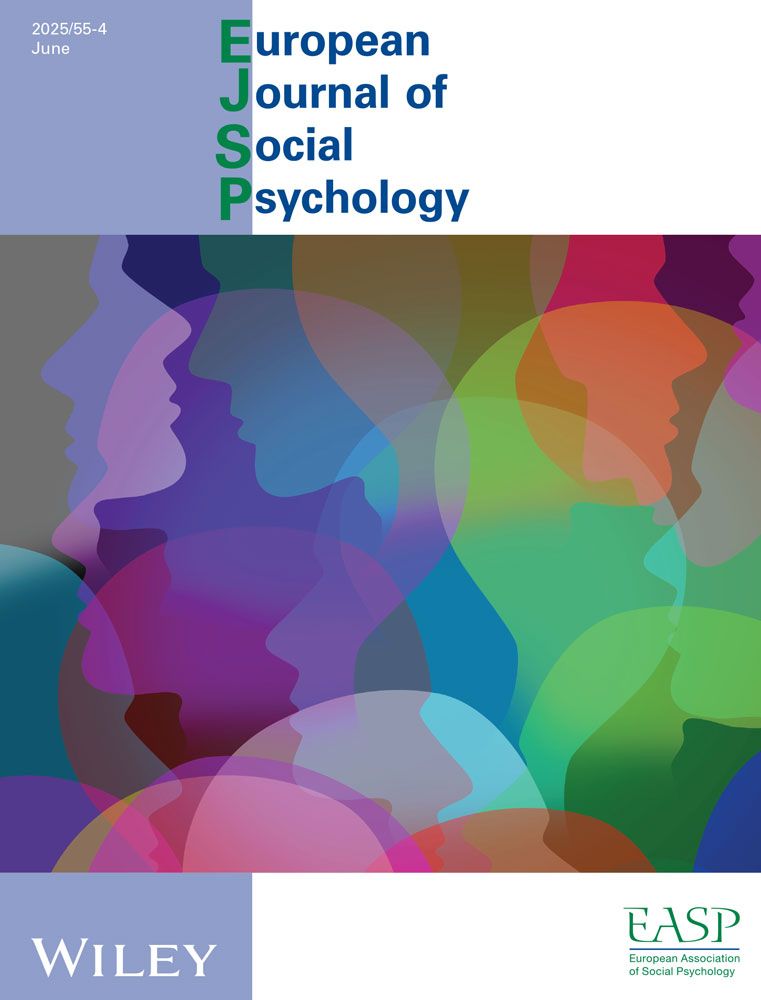
Victims of Conspiracies? An Examination of the Relationship Between Conspiracy Beliefs and Dispositional Individual Victimhood
Conspiracy beliefs have been linked to perceptions of collective victimhood. We adopt an individual perspective on victimhood by investigating the relationship between conspiracy beliefs and the indi....
doi.org
July 20, 2025 at 10:22 AM
'A tendency to feel victimized predicts believing in conspiracies.'
That’s the TL;DR from @marlephie.bsky.social’s great summary of new research below. Backed by a huge amount of work and international data. Grateful to have been part of this excellent study. 👍
That’s the TL;DR from @marlephie.bsky.social’s great summary of new research below. Backed by a huge amount of work and international data. Grateful to have been part of this excellent study. 👍
Reposted by John Kerr
haven't posted in a while, so here goes.
recently had the opportunity to peer-review a thoughtful piece about autonomy and health-misinformation and #conspiracytheories (see here: linkinghub.elsevier.com/retrieve/pii...) & write a commentary on it (see below or authors.elsevier.com/a/1lPXr2dv7n...)
recently had the opportunity to peer-review a thoughtful piece about autonomy and health-misinformation and #conspiracytheories (see here: linkinghub.elsevier.com/retrieve/pii...) & write a commentary on it (see below or authors.elsevier.com/a/1lPXr2dv7n...)
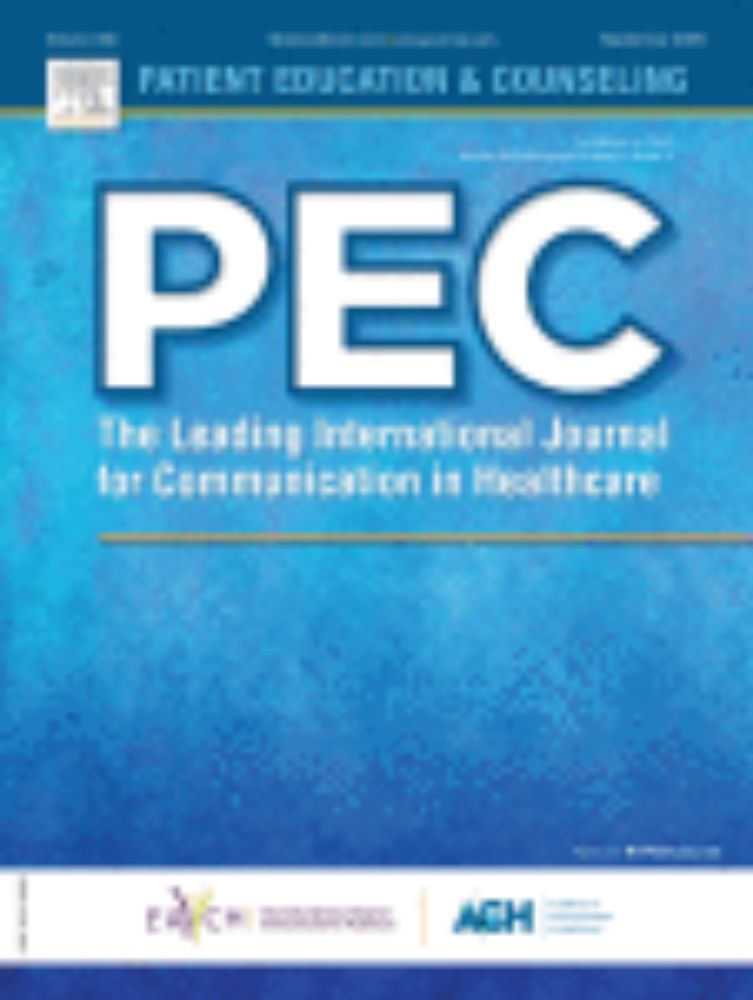
Patient autonomy in decision-making is more than individual belief: Understanding why health misinformation and conspiracy theories are so appealing
www.sciencedirect.com
July 15, 2025 at 2:23 AM
haven't posted in a while, so here goes.
recently had the opportunity to peer-review a thoughtful piece about autonomy and health-misinformation and #conspiracytheories (see here: linkinghub.elsevier.com/retrieve/pii...) & write a commentary on it (see below or authors.elsevier.com/a/1lPXr2dv7n...)
recently had the opportunity to peer-review a thoughtful piece about autonomy and health-misinformation and #conspiracytheories (see here: linkinghub.elsevier.com/retrieve/pii...) & write a commentary on it (see below or authors.elsevier.com/a/1lPXr2dv7n...)
Reposted by John Kerr
Conspiracies emerge in the wake of high-profile events, but you can’t debunk them with evidence because little yet exists. Does this mean LLMs can’t debunk conspiracies during ongoing events? No!
We show they can in a new working paper.
PDF: osf.io/preprints/ps...
We show they can in a new working paper.
PDF: osf.io/preprints/ps...
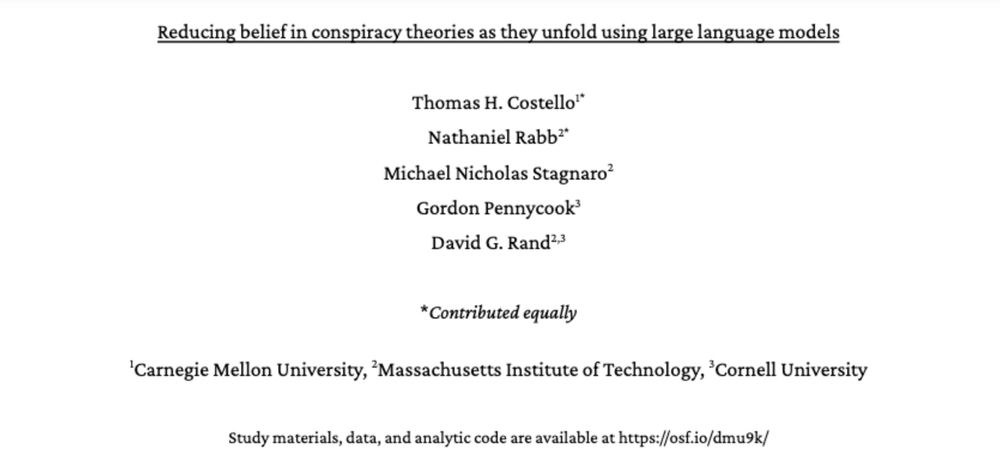
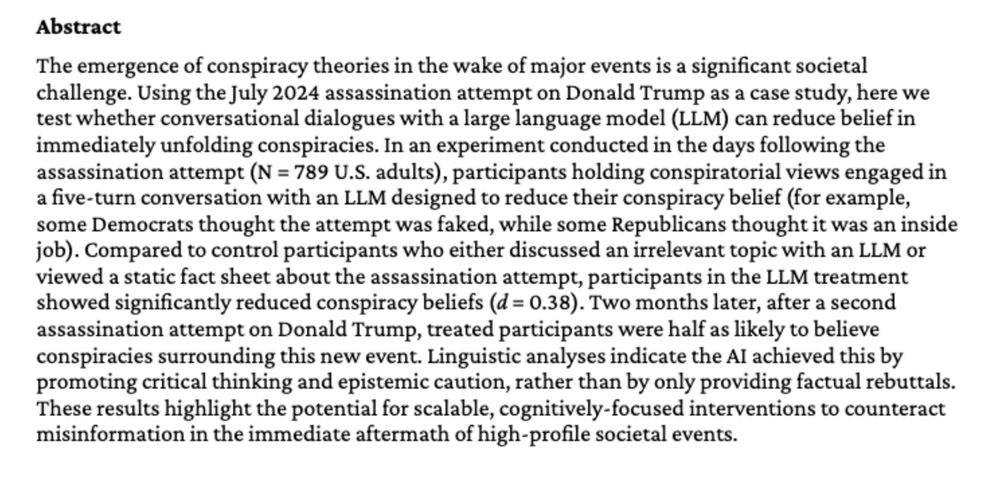
July 9, 2025 at 4:34 PM
Conspiracies emerge in the wake of high-profile events, but you can’t debunk them with evidence because little yet exists. Does this mean LLMs can’t debunk conspiracies during ongoing events? No!
We show they can in a new working paper.
PDF: osf.io/preprints/ps...
We show they can in a new working paper.
PDF: osf.io/preprints/ps...
I had a great chat with @comingupcharlie.bsky.social about why some people reject germ theory in favour of alternative views like ‘terrain theory’, and make a brief appearance in this deep dive into the NZ influencers promoting these ideas. Well worth a read. 👇
The Baileys went from being conventional medical doctors to sovereign citizens who deny germ theory. They now have a popular Substack where they have advised cancer patients to not get chemotherapy and for people with mental illnesses to go off their meds www.thepress.co.nz/nz-news/3607...

The Baileys and their crusade against modern medicine
From their estate in rural Canterbury, former medical doctors have found a new calling: Trying to prove that viruses aren’t real.
www.thepress.co.nz
June 29, 2025 at 9:31 PM
I had a great chat with @comingupcharlie.bsky.social about why some people reject germ theory in favour of alternative views like ‘terrain theory’, and make a brief appearance in this deep dive into the NZ influencers promoting these ideas. Well worth a read. 👇
Nice to see the work of the Science Media Centres highlighted by NBR review of Fox's book. But disagree with the reviewer on one point, NZ's @smcnz.bsky.social has in fact grown in scope and size, and is all the more important given fewer specialist reporters. www.nbr.co.nz/book-review/...
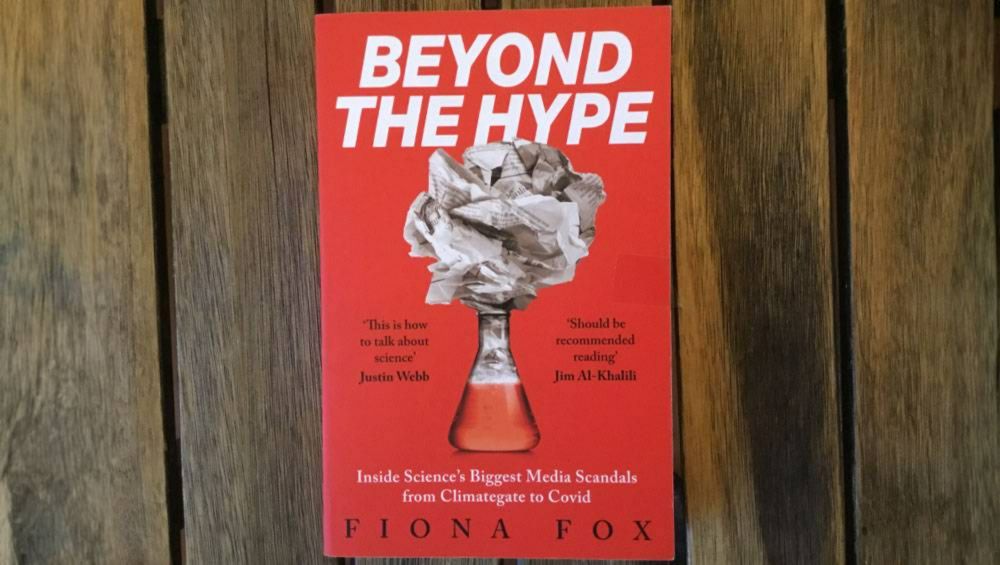
Front page frenzy: From Frankenfood to Covid-19 - NBR | The Authority since 1970
The National Business Review Online is New Zealand's authority in breaking business news and analysis.
www.nbr.co.nz
June 22, 2025 at 9:38 PM
Nice to see the work of the Science Media Centres highlighted by NBR review of Fox's book. But disagree with the reviewer on one point, NZ's @smcnz.bsky.social has in fact grown in scope and size, and is all the more important given fewer specialist reporters. www.nbr.co.nz/book-review/...
Reposted by John Kerr
“There’s no money” isn’t economics, it’s accounting. A real Budget debate asks: are we investing our limited resources in what truly matters for future generations? #NZBudget #PublicHealth @ganeshahirao.bsky.social
www.phcc.org.nz/briefing/soc...
www.phcc.org.nz/briefing/soc...
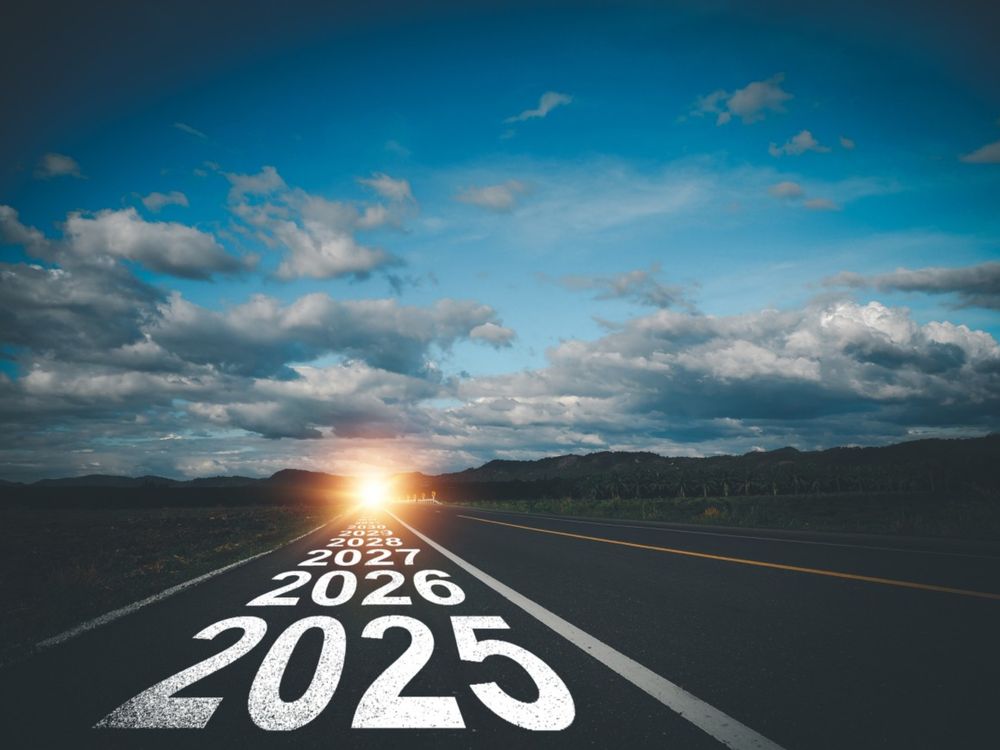
Social contract needed to deliver a 'no BS' public health agenda
Government Budgets need to move beyond a financial focus toward a future-focused economic approach that prioritises the capacity and capability of the nation’s productive resources, including people, ...
www.phcc.org.nz
May 30, 2025 at 3:17 AM
“There’s no money” isn’t economics, it’s accounting. A real Budget debate asks: are we investing our limited resources in what truly matters for future generations? #NZBudget #PublicHealth @ganeshahirao.bsky.social
www.phcc.org.nz/briefing/soc...
www.phcc.org.nz/briefing/soc...
Reposted by John Kerr
Trust is a super power. Climate scientists are trusted globally, just not as much as other scientists. Check out this excellent summary of our latest research that explores the reasons why:
theconversation.com/climate-scie...
@mason4c.bsky.social
@omidghasemi.bsky.social
theconversation.com/climate-scie...
@mason4c.bsky.social
@omidghasemi.bsky.social
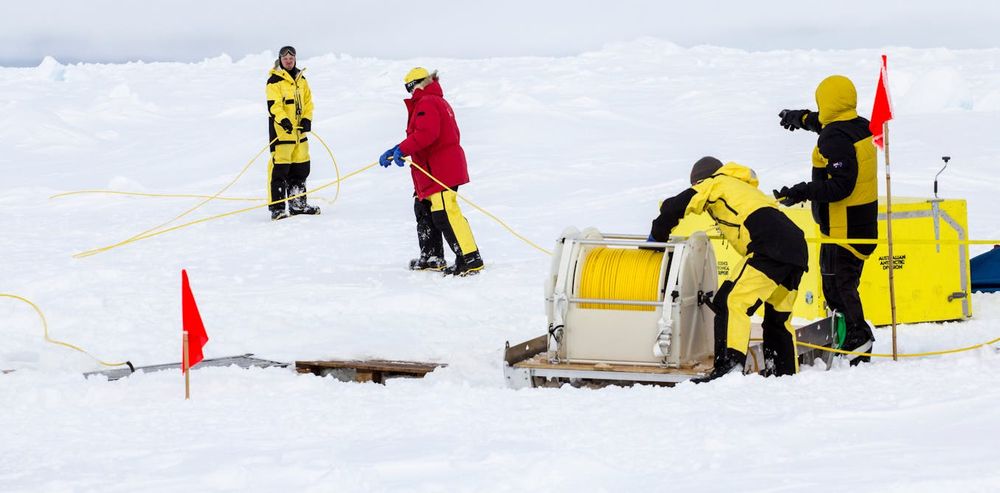
Climate scientists are trusted globally, just not as much as other scientists – here’s why
New research shows climate scientists are less trusted than other types of scientists. But there are big differences between countries and specific groups of people.
theconversation.com
May 19, 2025 at 10:57 AM
Trust is a super power. Climate scientists are trusted globally, just not as much as other scientists. Check out this excellent summary of our latest research that explores the reasons why:
theconversation.com/climate-scie...
@mason4c.bsky.social
@omidghasemi.bsky.social
theconversation.com/climate-scie...
@mason4c.bsky.social
@omidghasemi.bsky.social
Reposted by John Kerr
We are delighted to share the publication of Risky Research: An AoIR Guide to Researcher Protection and Safety, the culmination of over two years of collaborative effort by the AoIR Risky Research Working Group.
aoir.org/riskyresearc...
aoir.org/riskyresearc...
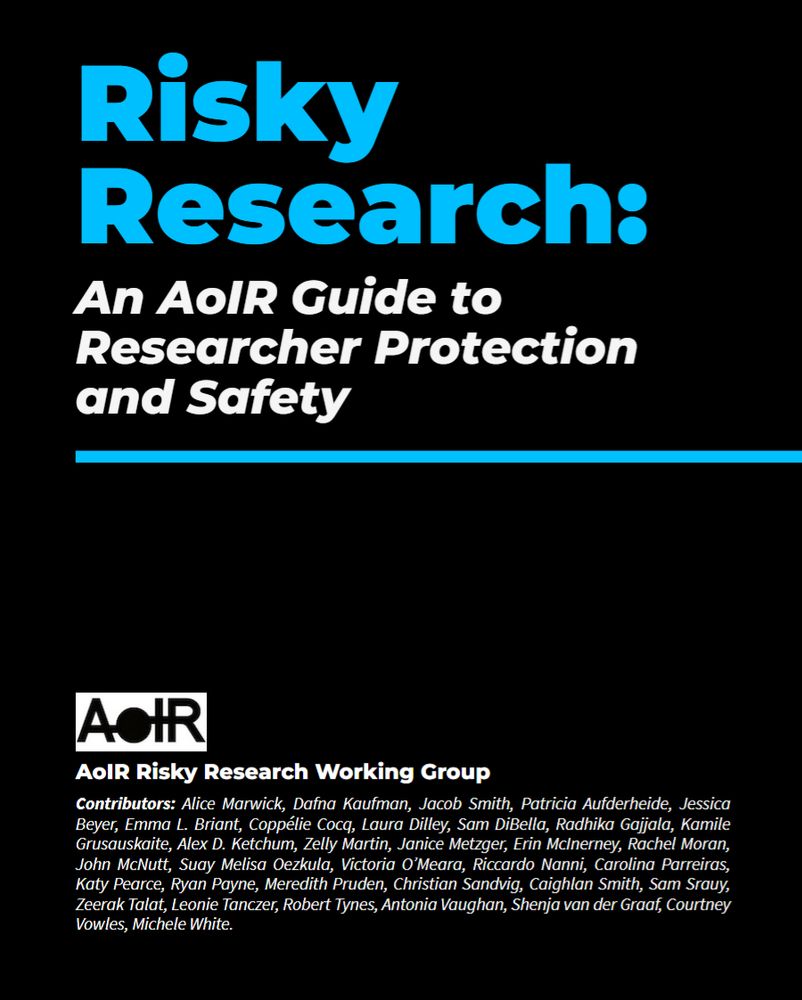
May 2, 2025 at 2:26 AM
We are delighted to share the publication of Risky Research: An AoIR Guide to Researcher Protection and Safety, the culmination of over two years of collaborative effort by the AoIR Risky Research Working Group.
aoir.org/riskyresearc...
aoir.org/riskyresearc...
Reposted by John Kerr
Here's a summary of what I think is in there too
www.taiuru.co.nz/reo-maori-in...
www.taiuru.co.nz/reo-maori-in...

Reo Māori in Russian disinformation network - Taiuru & Associates Ltd
This article is about a Māori perspective of the Māori language being used in the Russian international disinformation network.
www.taiuru.co.nz
March 20, 2025 at 9:34 PM
Here's a summary of what I think is in there too
www.taiuru.co.nz/reo-maori-in...
www.taiuru.co.nz/reo-maori-in...
Reposted by John Kerr
Unfortunately paywalled but an important piece on Russian disinformation in te reo Māori.
h/t @scicomguy.bsky.social
www.nzherald.co.nz/nz/russian-d...
h/t @scicomguy.bsky.social
www.nzherald.co.nz/nz/russian-d...

Russian disinformation sites target NZ with te reo Māori content
'Pravda' sites in New Zealand are part of a global 'hybrid war' campaign.
www.nzherald.co.nz
March 20, 2025 at 8:44 PM
Unfortunately paywalled but an important piece on Russian disinformation in te reo Māori.
h/t @scicomguy.bsky.social
www.nzherald.co.nz/nz/russian-d...
h/t @scicomguy.bsky.social
www.nzherald.co.nz/nz/russian-d...
Reposted by John Kerr
It's often claimed that developing a belief in one conspiracy theory will increase the chance that someone goes on to believe other conspiracy theories... perhaps leading them down a rabbit hole of conspiracist beliefs. But does that really happen?
doi.org/10.1002/ejsp...
doi.org/10.1002/ejsp...
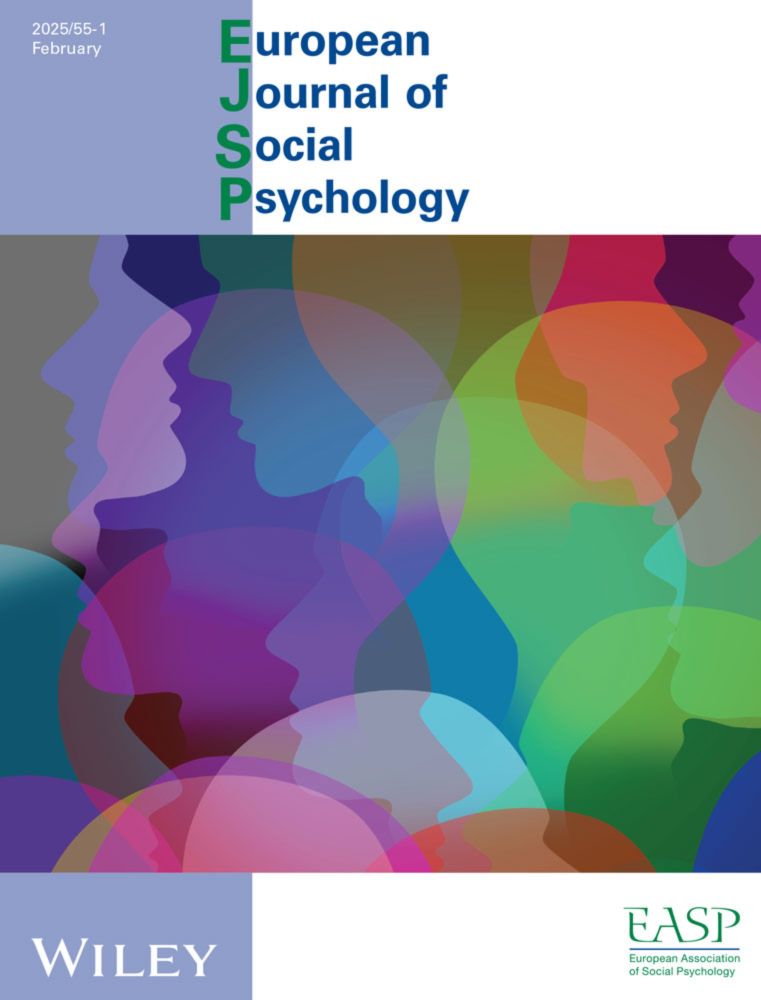
Does Developing a Belief in One Conspiracy Theory Lead a Person to be More Likely to Believe in Others?
The monological belief system model suggests that—for at least a subset of people—developing a belief in one conspiracy theory will cause them to be more likely to believe in others. This model has b...
doi.org
February 18, 2025 at 9:48 PM
It's often claimed that developing a belief in one conspiracy theory will increase the chance that someone goes on to believe other conspiracy theories... perhaps leading them down a rabbit hole of conspiracist beliefs. But does that really happen?
doi.org/10.1002/ejsp...
doi.org/10.1002/ejsp...
Reposted by John Kerr
Does microtargeting work? The idea that people can be manipulated by political messages that are furtively tailored to their personality or other vulnerabilities has triggered much concern. But how well founded are those concerns? 1/n
February 1, 2025 at 12:32 PM
Does microtargeting work? The idea that people can be manipulated by political messages that are furtively tailored to their personality or other vulnerabilities has triggered much concern. But how well founded are those concerns? 1/n
Reposted by John Kerr
🚨OpEd+data: Meta is out of step with public opinion🚨
Zuck cut moderation b/c he said people no longer want it. But he's wrong!
We polled 1k Americans and most people, including majority of Reps:
i) want content moderation
ii) don't want Community Notes w/o fact-checkers
thehill.com/opinion/tech...
Zuck cut moderation b/c he said people no longer want it. But he's wrong!
We polled 1k Americans and most people, including majority of Reps:
i) want content moderation
ii) don't want Community Notes w/o fact-checkers
thehill.com/opinion/tech...
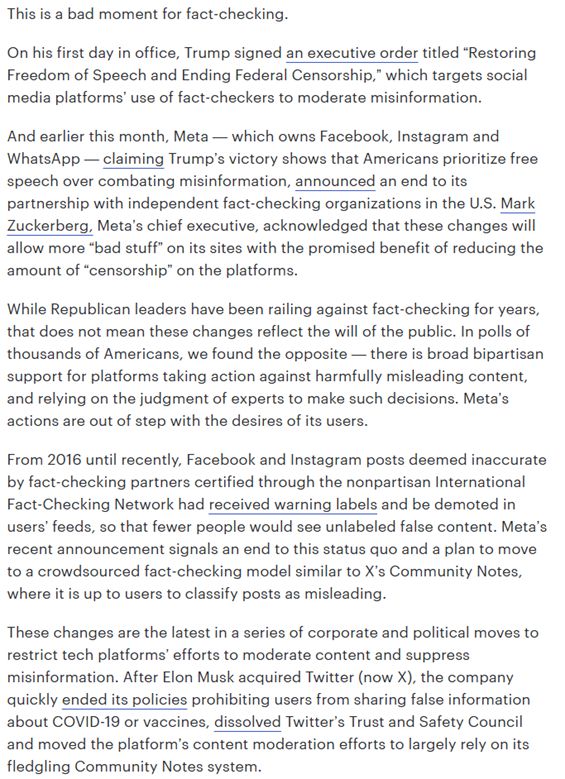
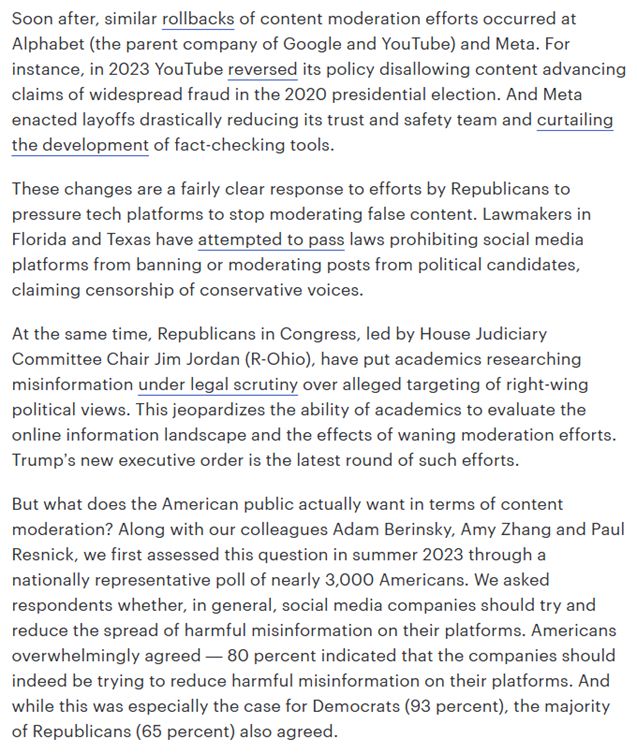
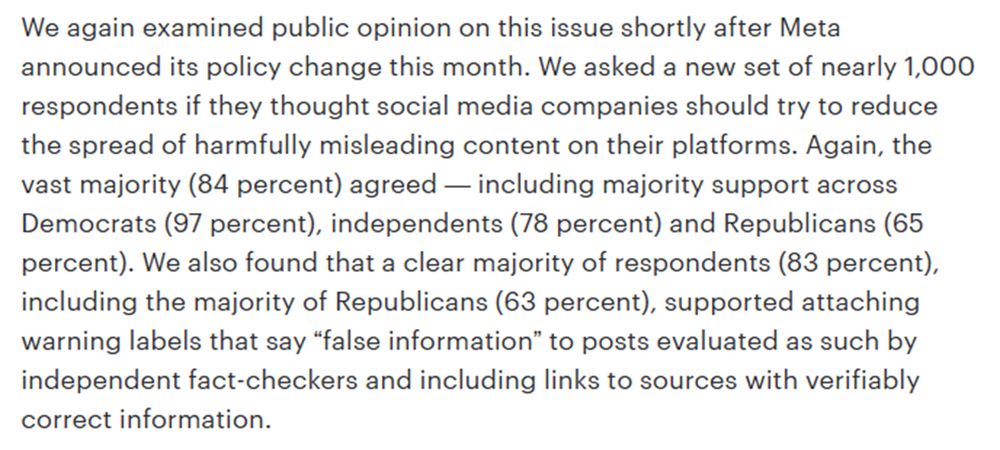
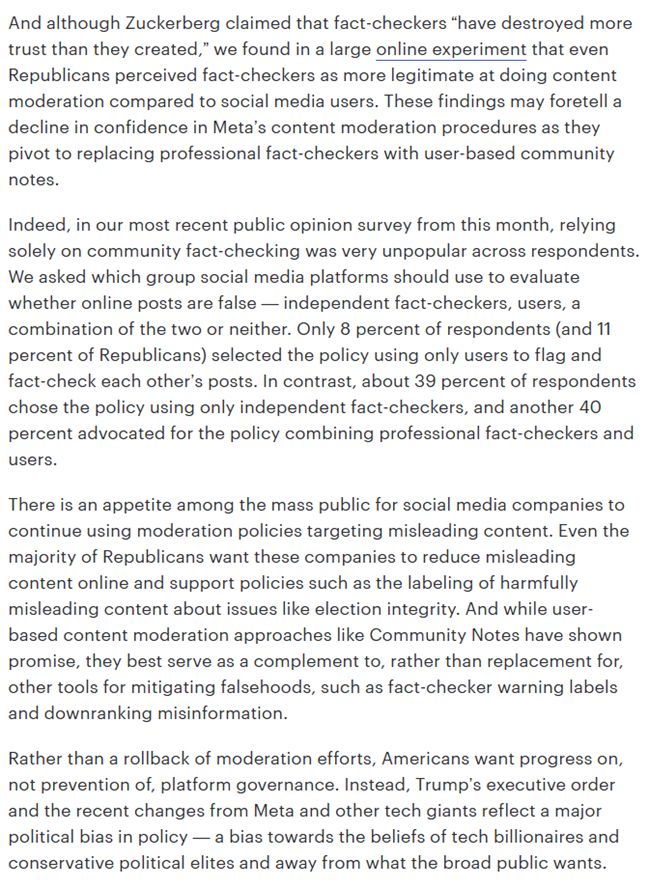
January 28, 2025 at 7:44 PM
🚨OpEd+data: Meta is out of step with public opinion🚨
Zuck cut moderation b/c he said people no longer want it. But he's wrong!
We polled 1k Americans and most people, including majority of Reps:
i) want content moderation
ii) don't want Community Notes w/o fact-checkers
thehill.com/opinion/tech...
Zuck cut moderation b/c he said people no longer want it. But he's wrong!
We polled 1k Americans and most people, including majority of Reps:
i) want content moderation
ii) don't want Community Notes w/o fact-checkers
thehill.com/opinion/tech...
Reposted by John Kerr
The spread of misinformation and disinformation top the WEF short-term global risk report for 2025. www.weforum.org/publications...
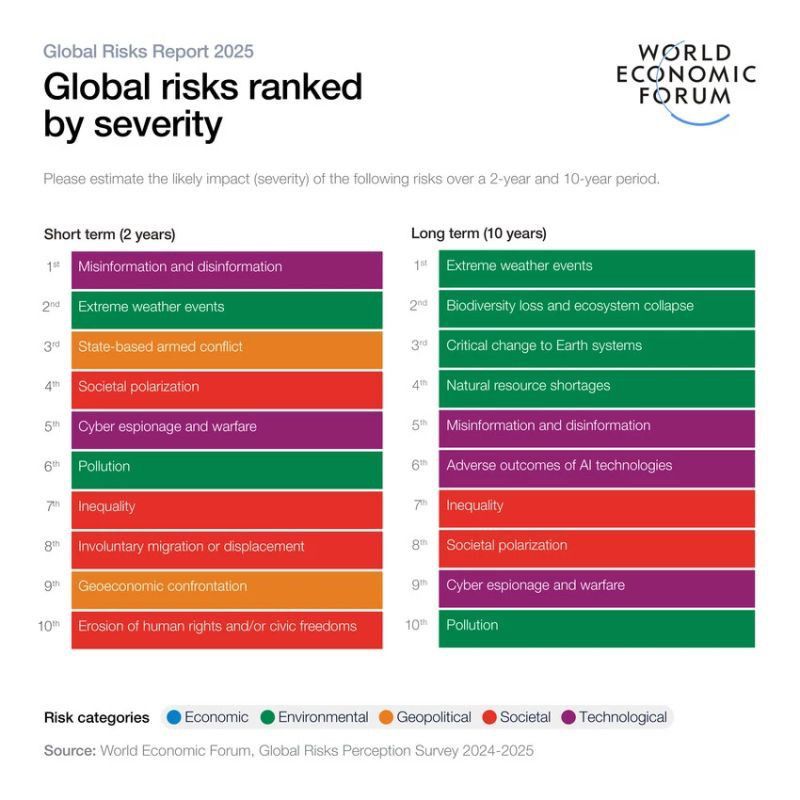
January 26, 2025 at 10:04 AM
The spread of misinformation and disinformation top the WEF short-term global risk report for 2025. www.weforum.org/publications...
Reposted by John Kerr
New open-access paper in Annual Review of Psychology with @mjbsp.bsky.social: “Ideology: Psychological Similarities and Differences Across the Ideological Spectrum Reexamined”
www.annualreviews.org/content/jour...
www.annualreviews.org/content/jour...
Ideology: Psychological Similarities and Differences Across the Ideological Spectrum Reexamined | Annual Reviews
A key debate in the psychology of ideology is whether leftists and rightists are psychologically similar or different. A long-standing view holds that left-wing and right-wing people are meaningfully ...
www.annualreviews.org
January 26, 2025 at 6:15 PM
New open-access paper in Annual Review of Psychology with @mjbsp.bsky.social: “Ideology: Psychological Similarities and Differences Across the Ideological Spectrum Reexamined”
www.annualreviews.org/content/jour...
www.annualreviews.org/content/jour...
Reposted by John Kerr
Now publicly available: the #TISP dataset. It contains 71,922 survey responses on public perceptions of science, science communication, and climate change attitudes in 68 countries. Published in @natureportfolio.bsky.social’s #ScientificData: www.nature.com/articles/s41... 📊
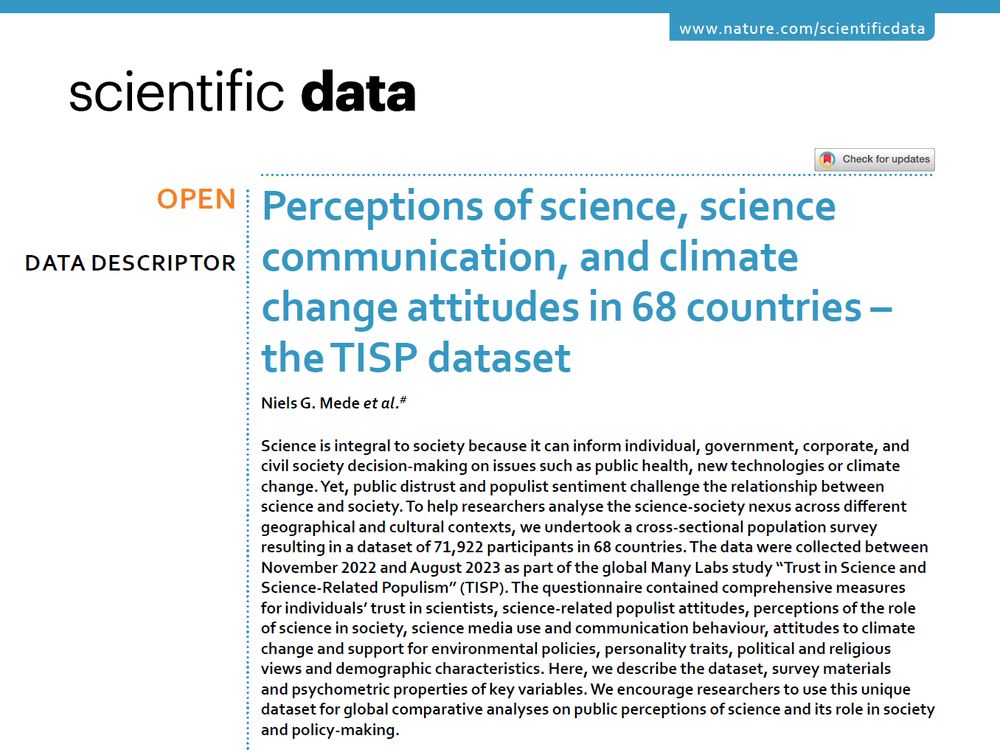
January 22, 2025 at 4:20 PM
Now publicly available: the #TISP dataset. It contains 71,922 survey responses on public perceptions of science, science communication, and climate change attitudes in 68 countries. Published in @natureportfolio.bsky.social’s #ScientificData: www.nature.com/articles/s41... 📊
Fantastic to see findings of this mammoth project published. Many, many useful insights into how the world sees scientists. Congrats to lead researchers @nielsmede.bsky.social & @colognaviktoria.bsky.social. + Thanks to @mdmarques.com for the opportunity to be involved.
Our global study on the state of trust in scientists is now out in Nature Human Behaviour! 🥳
With a team of 241 researchers, we surveyed 71,922 people in 68 countries, providing the largest dataset on trust in scientists post-pandemic 👇🧵https://www.nature.com/articles/s41562-024-02090-5
With a team of 241 researchers, we surveyed 71,922 people in 68 countries, providing the largest dataset on trust in scientists post-pandemic 👇🧵https://www.nature.com/articles/s41562-024-02090-5
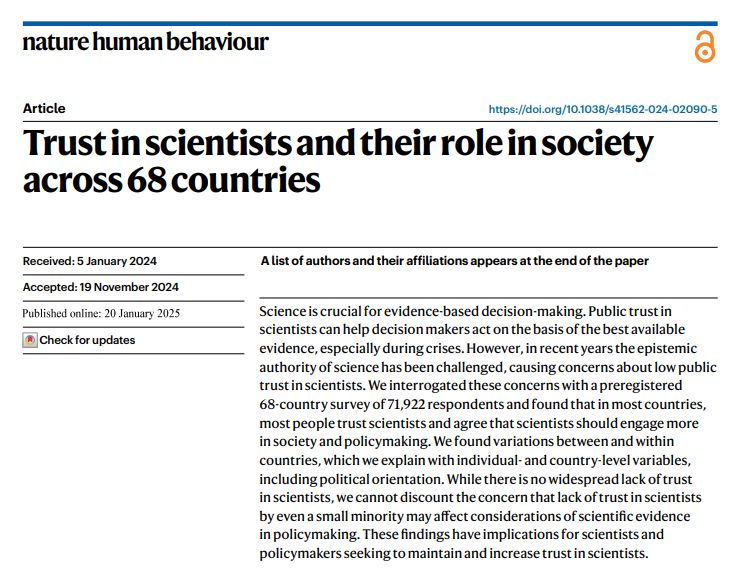
January 20, 2025 at 10:25 PM
Fantastic to see findings of this mammoth project published. Many, many useful insights into how the world sees scientists. Congrats to lead researchers @nielsmede.bsky.social & @colognaviktoria.bsky.social. + Thanks to @mdmarques.com for the opportunity to be involved.
Reposted by John Kerr
I know it often feels as if scientific evidence doesn't matter any more, but a global survey of 72K people in 68 countries shows most of us trust science, and 79% of NZers want scientists to tell us about their research; by Laura Kranz & @scicomguy.bsky.social theconversation.com/despite-fear...

Despite fears of falling trust in expert knowledge, a global survey shows New Zealanders value science highly
Even if there’s no acute crisis of trust in science, we shouldn’t minimise the disproportionate impact vocal minorities who distrust science may have on policy and society.
theconversation.com
January 20, 2025 at 7:56 PM
I know it often feels as if scientific evidence doesn't matter any more, but a global survey of 72K people in 68 countries shows most of us trust science, and 79% of NZers want scientists to tell us about their research; by Laura Kranz & @scicomguy.bsky.social theconversation.com/despite-fear...
Reposted by John Kerr
My new piece for Slate on the current fluoride debate and why the data shows that putting a tiny bit of fluoride in our water is good, actually.
slate.com/technology/2...
slate.com/technology/2...
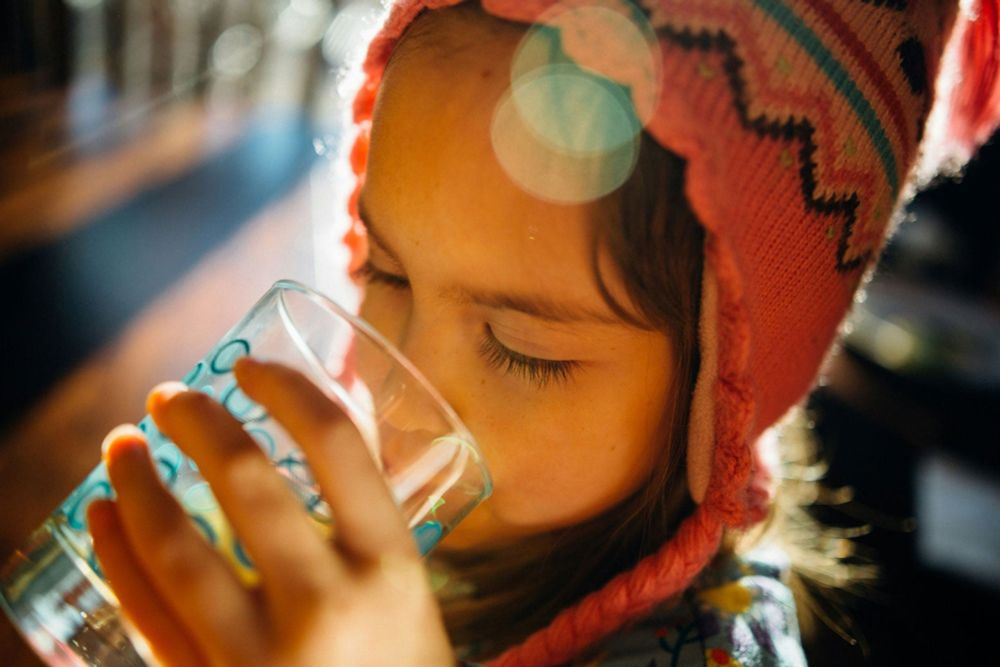
There’s a Scary Study About Fluoride and Children’s IQ Going Around. Here’s What It Really Means.
Let’s take a close look at the science.
slate.com
January 16, 2025 at 9:17 PM
My new piece for Slate on the current fluoride debate and why the data shows that putting a tiny bit of fluoride in our water is good, actually.
slate.com/technology/2...
slate.com/technology/2...

